
A mural on Temple Terrace City Hall celebrating the city's centennial [Photo by Paul Guzzo, University Communications and Marketing]
By Paul Guzzo, University Communications and Marketing
In the 1950s, as Florida planned a new state university in the Tampa Bay area, officials considered more than 100 potential names. Four of them included “Temple Terrace.” One even made the final shortlist before the institution was ultimately named the University of South Florida.
That early consideration was no coincidence. Temple Terrace and USF have long been linked — geographically, historically and culturally.
On May 28, the city turns 100.
As USF approaches its 70th anniversary, the two neighbors are more connected than ever, with shared projects, planning efforts and a vision for what the future holds.
“There has always been a synergy between USF and Temple Terrace,” said Eric Eisenberg, USF's senior vice president for University Community Partnerships.
A shared beginning
The roots of this relationship run deeper than most realize — back to a time before either the city or the university existed.
Their story begins with Bertha Palmer, “a Chicago socialite drawn to Florida for its mild winters and abundance of untamed forestland brimming with game,” the late history columnist Leland Hawes wrote in the Tampa Tribune.
After the death of her husband, Palmer moved to Sarasota County in 1910. Then, four years later, she purchased 19,000 acres in Hillsborough County to establish a hunting preserve known as Riverhills Ranch.
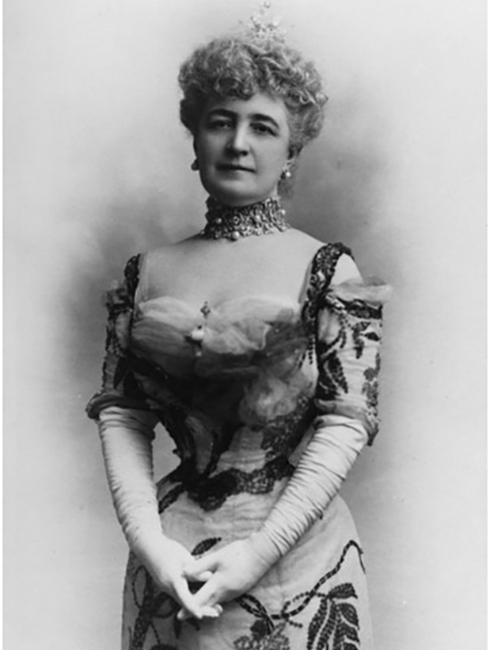
Bertha Palmer [Photo courtesy of Art Institute of Chicago]
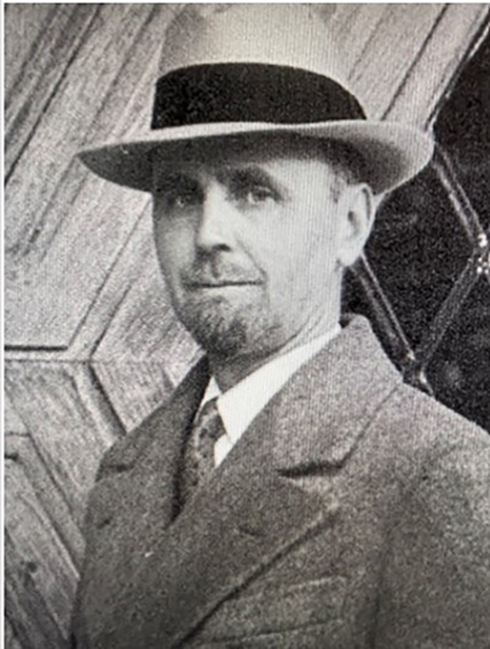
Dwight Baum [Photo courtesy of Little Falls Historical Society]
“A 1916 Hillsborough County atlas shows the ranch includes land that would later become Temple Terrace and USF,” said Rodney Kite Powell, director of the Tampa Bay History Center’s Touchton Map Library who earned a master’s degree in Florida history from USF in 2003.
When Palmer died in 1918, her estate sold a portion of the land to developers who envisioned a Mediterranean-style community just outside Tampa. They named it Temple Terrace, inspired by the temple oranges grown in the area's 5,000-acre grove.
“An early golf course was built to attract northern settlers and investors,” said Gary Mormino, professor emeritus and co-founder of the Florida Studies program at USF. “The investment plan attracted northerners who would live six months per year in Florida and own an orange grove for income. The 18-hole Temple Terrace Golf Course was considered one of the first in Florida.”
Construction began during the time known as the Florida land boom.
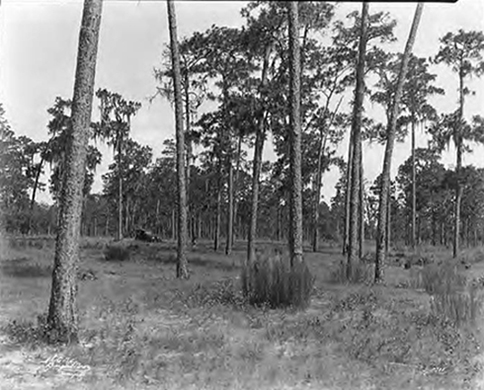
Undeveloped land in 1920 that would later become Temple Terrace and USF [Courtesy of the Tampa-Hillsborough County Public Library System]
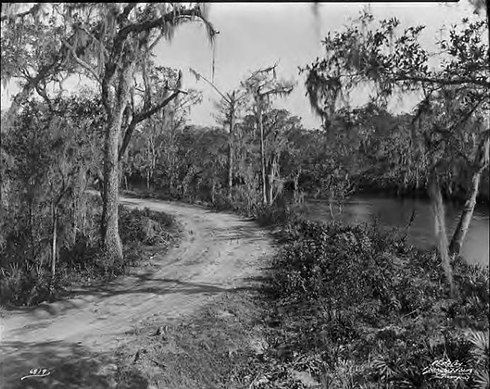
North Riverhills Drive along Hillsborough River in Temple Terrace in 1921 [Courtesy of the Tampa-Hillsborough County Public Library System]
“But the land boom collapsed in late 1926,” Kite-Powell said. “Then, a year or two later, Florida orange groves were infested with the Mediterranean fruit fly.”
Temple Terrace’s development stalled.

The Temple Terrace orange groves in 1923 [Courtesy of the Tampa-Hillsborough County Public Library System]
The initial construction phase was to include 120 homes designed by Dwight Baum, a nationally renowned architect whose previous work included the Sarasota mansion of circus pioneer John Ringling. Only a quarter of those homes were built.
“But Temple Terrace was set up in a great way,” Kite-Powell said. “They had roads and sidewalks and parks and infrastructure. They were just waiting for a second chapter.”
From airfield to alma mater
During World War II, another part of the former Palmer ranch was transformed into the Henderson Army Airfield. After the war, the site was chosen for a new state university.
Early name suggestions reflected the area’s heritage. Proposals included Temple Terrace State University, Collins Temple University (for then-Gov. LeRoy Collins) and University of Florida at Temple Terrace.
Florida Temple Terrace University was among the finalists.
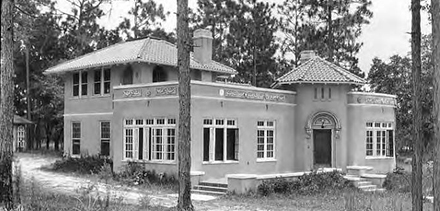
One of Temple Terrace's first homes, built in 1925 [Courtesy of the Tampa-Hillsborough County Public Library System]
The University of South Florida name won out because it had broader state and national appeal.
But even without its name on the sign, Temple Terrace has been integral to USF’s identity, with students and employees living and playing in the beautiful neighboring suburb.
“We love having them here,” said Temple Terrace Mayor Andrew Ross, whose daughter is a current USF student and wife and son are alumni. “Because of that relationship, we enjoy one of the highest education levels per capita of any city in Florida. And then we get all these people from USF and their events spilling into our restaurants and businesses. If Gainesville is Gator Country, then Temple Terrace can be Bulls Country.”
Shared growth, shared future
As both USF and Temple Terrace continue to grow, so does their collaboration and coordination.
“We are interconnected with them around what is happening at the MOSI site that could add a new indoor sports complex,” Eisenberg said. “We’ve also been meeting with the Temple Terrace mayor and city manager about how USF’s new stadium could impact their neighborhoods and how we can make it an asset. And USF and Temple Terrace have been meeting with the Florida Department of Transportation to discuss what improvements can be made to Fowler Avenue, which we both have interests in.”

Temple Terrace Mayor Andrew Ross [Photo courtesy of the city of Temple Terrace]
One of the newest joint efforts is a Leadership and Innovation Program launching under the Temple Terrace Uptown Chamber of Commerce. Starting this August, participants will tour local businesses and government offices while exploring real-world solutions to community challenges.
USF is helping plan and brand the program, providing meeting space and faculty expertise in areas such as technology, cybersecurity and health care.
“The goal is to develop a well-rounded understanding of management of local government strengths and challenges,” said Stephanie Skupien, creative director and project manager for University Community Partnerships. “Temple Terrace and USF want to continue to work together to enhance the quality of life in the area.”
Mayor Ross sees even more potential ahead.
“With the MOSI redevelopment, the Fowler Avenue corridor, and everything going on around USF and Temple Terrace, this region is the next big thing,” he said. “Temple Terrace had a little jump on USF, being incorporated first — but we’ve had a relationship almost from the start. Our histories have always been, and will always remain, intertwined.”
